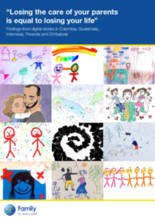This report explores what family means to children and adults in five countries using the digital storytelling technique. Digital storytelling uses storytelling methods to gain deep insights into feelings and experiences. Participants create individual stories about aspects of their own lives using still images and sound. Stories range from the impacts on children of family separation, multiple care moves, grief and not being heard; to the importance of meeting children’s needs, strengthening families, and supporting children’s resilience and tenacity. The stories highlight the importance of listening to children to both inform policy change and inform individual support needs.
Digital storytelling for transformation (DST) is a creative, participatory audiovisual process that helps people to tell a personal story through a collective process. It uses digital technology to communicate and amplify this story. A digital story is a short two-three minute film sequence made up of static images that is consciously prepared and told as a first person narrative, from the heart. The tools and methods applied to the DST process have evolved over the past ten years, as a way of working closely with different groups of people in order to gain deeper understanding of the multiple and complex ways that people’s lives are affected by the social issues that are most relevant to them. The process is carried out with the intention of building new knowledge, skills and self-confidence for the storytellers, and building connections between the storytellers taking part in the same process together.
Family for Every Child initiated a DST project in 2014 to enable member organisations to develop films with children, parents and caregivers that would provide valuable insights into family care or care outside of families. Why Family Matters to Me was published in 2016 to share the findings of the films produced. The report focused on: family types, and families as a source of love, affection, support and identity, as well as of discrimination, violence, abuse and neglect.
The second phase of the project started in 2016. Five members, from Colombia (Taller de Vida), Guatemala (CONACMI), Indonesia (Muhammadiyah), Rwanda (Uyisenga Ni Imanzi) and Zimbabwe (FOST), were involved in the project, which started with a five-day residential training of trainers workshop. During this training, participants learnt how to make a digital story themselves to gain hands-on, personal experience with the transformative and therapeutic power of the tool, reflected on the family in their context, and learnt about and developed the ethical protocol for the research. The ethical protocol included processes for consent for participation and use of films, a risk assessment, and the protocol for taking any urgent action needed to safeguard participants, with potential scenarios discussed.
Fifty-five films were made, of which 33 were made by children (19 girls and 14 boys). Seventy per cent of children who participated in the project were living with their parents while the remaining 30 per cent lived with their relatives. The remaining films were made by adults who were either parents or caregivers, young people who had participated in the work of the participating members as children, or staff of the member organisations. For this report, the films of the young people have been analysed alongside those of the children; the films of the staff members have not been included in the analysis.
Read the Spanish version here.
A selection of videos can be viewed here

